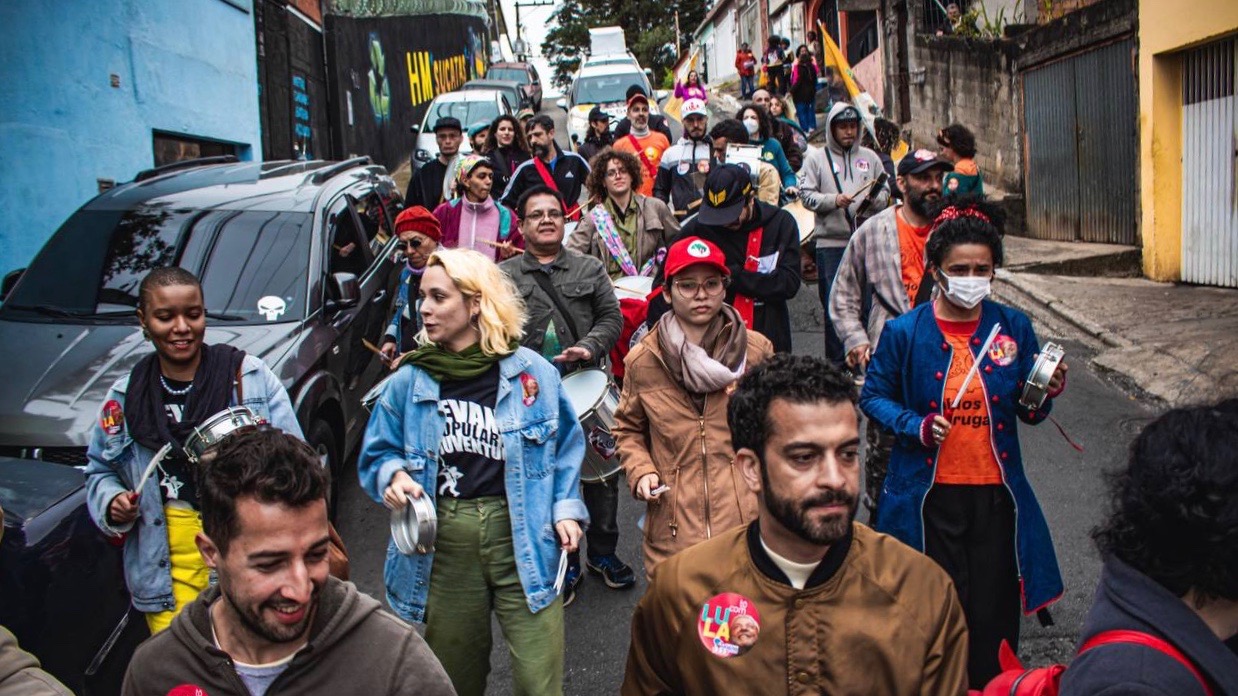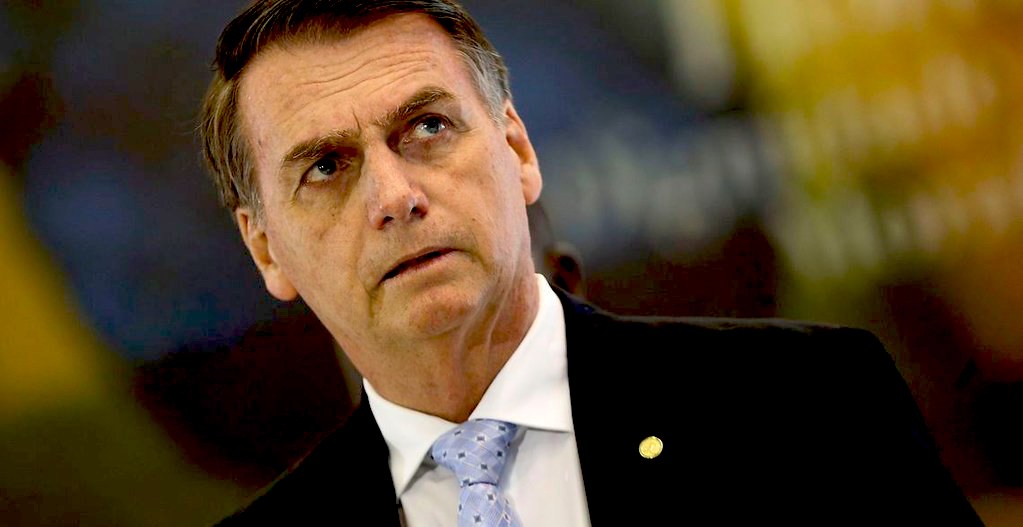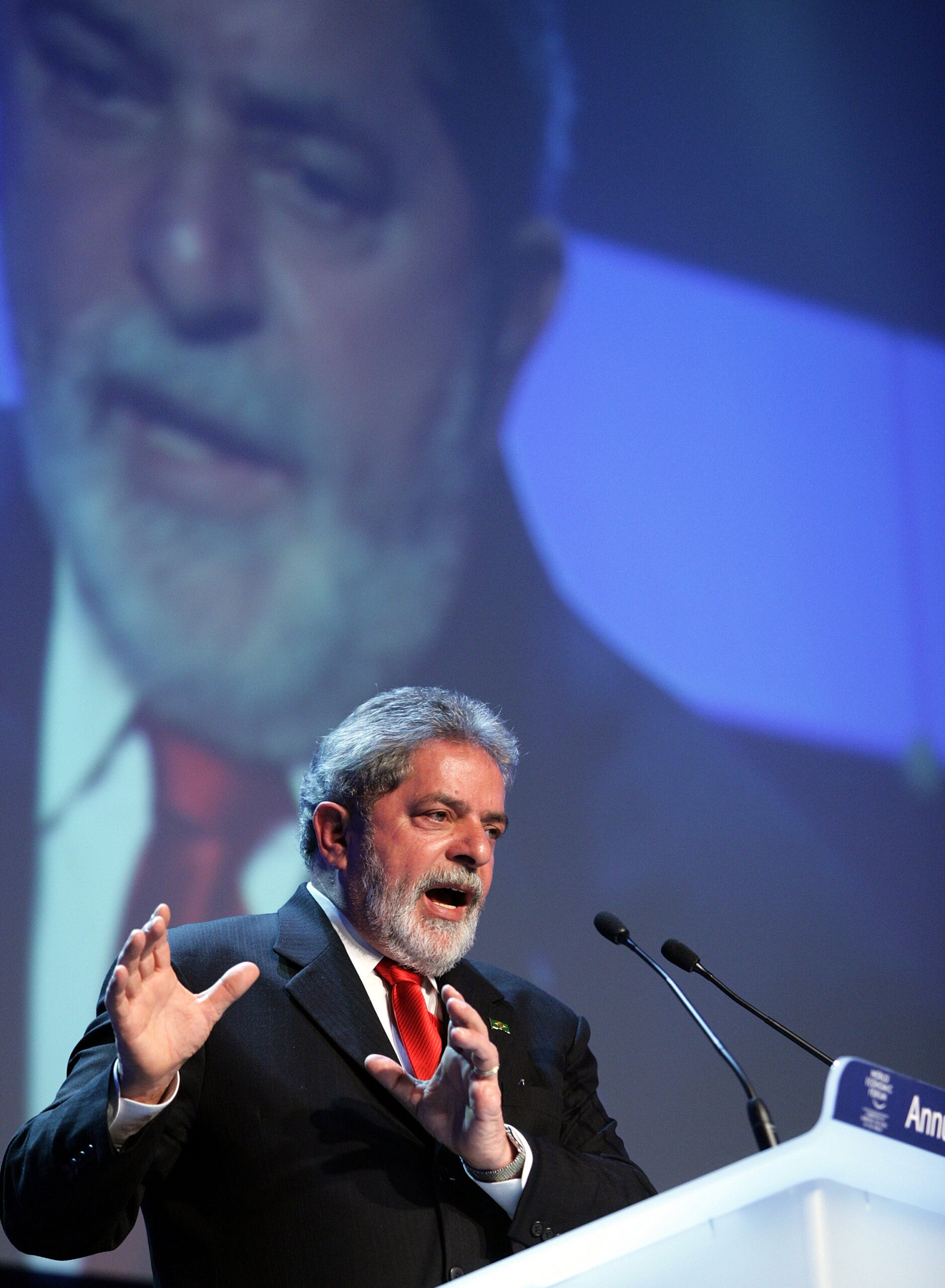Ahead of Sunday’s elections, Zoe Alexandra reports on Evangelicals as an important voting bloc in Brazil and the effort by Workers’ Party supporters to reach them.

(People’s Dispatch)
By Zoe Alexandra
Peoples Dispatch
Ahead of the election in Brazil on Sunday, campaigning is in its final stage. Across the country, parties and supporters are organizing mass rallies, parades, festivals, motorcycle processions, social media campaigns and more to promote their candidates and their vision of the country.
One of the major groups which candidates and their campaigns have attempted to court in this campaign is Evangelical Christians, members of a broad movement within Protestant Christianity focused on a personal relationship with Jesus Christ, spiritual rebirth and spreading the “gospel” or good news.
According to a survey by the Datafolha Institute, Evangelical Christians are one of the fastest growing religious groups and today account for at least 31 percent of the population. In the 2018 elections, 70 percent of voters who identified as Evangelical Christians voted for President Jair Bolsonaro and were the decisive vote that helped Bolsonaro achieve victory.
While Bolsonaro defines himself as Catholic, he is one of the most prominent political figures supporting Evangelicalism. He himself was baptized in 2016 by Pastor Everaldo from the Social Christian Party and the Assemblies of God Church and his wife is an active Baptist in the mega-church Igreja Batista Atitude.
Throughout his presidency and during the campaign, Bolsonaro has demonstrated and proclaimed his support for Evangelical churches, whether it be through meetings with pastors, participation in “Marches for Jesus,” or using Christian concepts in his campaign rally speeches.

Jair Bolsonaro in 2018. (Jeso Carneiro, Flickr, CC BY-NC 2.0)
However, leading up to the 2022 elections, support for the far-right incumbent president was not overwhelming among Evangelicals. A Datafolha survey indicated that 48 percent of Evangelical voters support Bolsonaro, while 31 percent support Workers’ Party candidate Luiz Inácio Lula da Silva.
Recognizing the importance of reaching out to this broad section of the population, various progressive organizations such as the Evangelical Front for the Rule of Law, the Popular Struggle Committees (formed to reactivate grassroots political work ahead of the elections), the Landless Rural Workers’ Movement (MST), the Movement of Workers for Rights (MTD), and others have been organizing dialogues and targeted campaigns to engage with this sector of the population and attempt to bring some of the Evangelical vote to the left.
Donate to CN’s 2022 Fall Fund Drive
Angélica Tostes, theologian and researcher from the Tricontinental: Institute for Social Research, told Peoples Dispatch during a “Dialogue with Evangelicals” event, “We often say that in politics there are no empty spaces. So, if we are not talking with at least 31 percent of the population, we are not talking with a big group.”
Addressing Misconceptions
For these organizations, the process of swinging the Evangelical vote begins with breaking down the misconceptions among the left about Evangelicals in Brazil.
“The majority of Evangelicals do not fit the profile of what the media shows us — the white middle class man, those pastors who call for violence,” the Tricontinental researcher told Peoples Dispatch.
“We are usually talking about poor, Black women from working-class neighborhoods who are at the base of the capitalist pyramid and are the most affected by these policies of neoliberal dismantling.”
It is essential that the left not homogenize this section of the population, Tostes said.
“Not all Evangelicals are fundamentalists, nor are all of them conservative. So, when we dismantle this idea that Evangelicals are the same, we can better understand this field, which is complex…because nobody has just one identity. They are Evangelicals but they are also people who are facing racism and gender inequality, and struggling – especially the youth – to find jobs.”
She concluded, “We need to understand a little more of our working class, which today is Evangelical.”
Tostes helped compile a report published in February 2022 by Tricontinental: Institute for Social Research called “Resisting with Faith,” which through interviews and research sought to explain some of the key questions surrounding the growth of Evangelical Christians in the country, such as: Who are Evangelicals today in Brazil? What drives people to go to Church? What do they look for there? What are their perspectives on the left?
Looking Left

Luiz Inacio Lula da Silva in 2005, while president of Brazil. (World Economic Forum, Flickr)
Another central focus of the grassroots work between Evangelicals and progressive movements is to convince those who attend Evangelical churches of the importance of a people-centric, left political project, which in these elections is represented by the candidacy of former President Lula da Silva of the Workers’ Party.
As the Evangelical Front for the Rule of Law explains in its mission statement:
“Brazil is going through a religious transition and is witnessing the rise of the Evangelical Right. Its groups are organizing a parliamentary caucus, blocking the advance of human rights, manipulating huge groups through moralistic agendas and selling false solutions to the people. This has also been the case in several other countries around the world. However, we discover, day after day, that there is growing space for the political awareness and organization of this segment. Unfortunately, part of the popular-democratic field still does not recognize the need to approach the evangelical people, except on electoral occasions.”
Lívia Martins de Carvalho, a pastor of the Pentecostal Evangelical Church of Jesus Christ and Bishop of the Iglesia Antigua de las Américas who participated in the “Dialogue with Evangelicals” told Peoples Dispatch that the coming together of progressive spaces and the church is natural. She said,
“When we are talking about the question of the progressive sector, we are talking about something more oriented to the people, something more focused on social issues. And I see this a lot in the actions of Jesus, the social issues, the people, this act of giving food, and multiplying, of caring for those who are oppressed by the State because they are despised.”
Carvalho, who belongs to a “garage church” — self-organized and often linked to larger churches — in São Paulo’s periphery, pointed out that, “the importance of the Church entering into dialogue with progressive sectors is there, with the people, with the social issues.”
However, she points out that there are still significant challenges, and while the majority of Evangelical churches are independent and not affiliated with the conservative mega-Churches, those politics of the latter still permeates. This, she explained, largely has to do with the high level of desire to attend Church services amongst Evangelicals.
“You visit one church one day and then the other. If there is no service in your church on Tuesday, you go to the church that has one. If there is no service on Wednesday, you go to the other one … Because of this flow, you have many more fundamentalist, more conservative thoughts, which end up reflecting in my community, for example. My community has people that are Bolsonarists, those who are already PTistas (Workers’ Party supporters), and then there are others from the center. It is very diverse in this sense, and we coexist.”
Carvalho emphasized that the crucial element here is to increase spaces of dialogues and exchange. “I believe that more meetings like this one will help us so that the dialogue will grow and the actions will grow.”
In the lead-up to the Oct. 2 elections, the Evangelical Front for the Rule of Law published and distributed campaign material in diverse formats to engage in this crucial dialogue and address right-wing messages that are often held up by faux-religious arguments. Their “Believers Do Not Fight With Human Weapons” pamphlet provides Christian arguments against the Bolsonarist gun drive. They produced a music video directed towards believers called “It is not a sin to vote for Lula.”
Whoever says it is a sin to vote for Lula doesn’t know what he is talking about.
He doesn’t read the Bible correctly and doesn’t even know what democracy is.
To vote for Lula is a right of every Brazilian, whether a believer or not.
A president of the Republic must govern for all, not only for a group of religious people.
Rest assured, my brother, my sister, it is not a sin to vote for Lula. It is a sin to promote death and destruction.
Zoe Alexandra is a correspondent for Peoples Dispatch.
This article is from Peoples Dispatch.
Donate Today to CN’s
2022 Fall Fund Drive
Donate securely by credit card or check by clicking the red button:

The Struggle between the Socialist Left and the Warmonger’s Right is at its zenith today, The Right is recognising the fact that its project is bankrupt, and more people are realising that they are poorer, more marginalised in favor of the Corrupt Politicians, Banks, Corporations, and the church has held their hands through history to keep its hegemony on the minds of uneducated, not politically savvy people who knew nothing about the fiendish plans to remodel the world according to their agenda, and keeping citizens as servile as possible.
I am wondering about, what the US with all its staff dedicated to destroying any progressive government any where in the world , is preparing for Lula da Silva??????. They have been doing just that for the last 70 years.
The “Left” has embraced a lot of issues as touchstone issues that are not left. To be a member of the Left club, you need to be pro-Abortion for instance. That many poor people view abortion as wrong, means that many poor people will never vote for the Progressive Parties. Perhaps, a more nuanced position would serve the left better….
Union Membership is another issue that the left needs to rethink. If you have ever talked to tradesmen, they will tell you in great detail why they do not like Unions. Again, perhaps the left needs to spend some time listening to the working poor explain why they don’t like Unions, and not come up with some version of “They are voting against their Own Interests”
I can go down many issues where this is true.
You make no sense to start, thus that you could “go down many issues” does not hold much promise.
The issue of whether the state can force a woman to carry a pregnancy she does not want is related to the retrograde notion of a male-dominated society, and the permeation of religion in government. It it therefore an issue everyone should care about both Left & Right & Center & Top & Bottom, because if the state can do that by power of tyranny of the majority, it can do anything to it’s citizens. It can make words illegal, it can strip citizenship, it can do anything. As is said, if men became pregnant you could get an abortion at an ATM.
Your analogy about unions is weak, I’ve worked in craft trades for 30 years and though in my small semi-rural state lots of guys hate unions, they hate all sorts of groups, they think the gubm’nt shouldn’t collect taxes to run schools. They are not peasants being run over by practically feudal business relationships with historic levels of wealth and jobsite safety disparity as happens in Latin America.
“You make no sense to start” states the rigid ideologue who apparently believes that beating people over the head until they bend unequivocally to his/her views is the only legitimate way to achieve progressive results. Such an attitude likely makes impossible the degree of reading comprehension required for composing a competent response.
The phrase “Perhaps, a more nuanced position would serve the left better…” really should have clued him/her in.
The Evangelical church in the US is one of the staunch supporters of Israel, it is an Apartheid state that was set up in the Middle East and took over Palestinian land using force led by Two famous Terrorist Organisations, and it functions as a military base, and aggressor in the region while killing women, children, elderly Palestinians on daily basis by the hands of settlers who came from Poland and else where.
This approach must to be adopted within the US and elsewhere. We cant discount the fact they are religious, but most are driven to the right by messaging (right wing) and aligning with those they have something I’m common with. Yet they are all oppressed, like most religious zealots in America. If we can connect left ideals and align with just principles, then perhaps well have more success. What we can’t do is take the liberal approach and say all these bible thumping rubes are useless. People are people. If the economics can be broken down to them carefully, there is a fighting chance we progress.
Let’s not pretend that the PT or Lula is in any way a socialist option for Brazilians. The party is doing all it can to reassure the ruling class of Brazil and the US government that – like Sir Keir Starmer’s Labour party here in the UK – it is a safe pair of hands to manage the capitalists exploitation of the country’s working class. As for Lula, as reported by WSWS he “recently bolstered his political turn towards imperialism with a largely scripted interview with the mouthpiece of Brazil’s agribusiness tycoons, Canal Rural, also on September 21, in which he made an unprecedented denunciation of late Venezuelan president Hugo Chavez, a historic target of US imperialism, which attempted to kidnap and murder him in a failed 2002 coup.”.
Certainly, Lula and the PT would be some improvement on Bolsonaro and the PL. But let’s not be under any illusion that they would do much if anything to improve the lives of the millions of Brazilians who will vote for him, but rather they will shore up the capitalist system that makes their lives so hard, and will show deference to US imperial power.